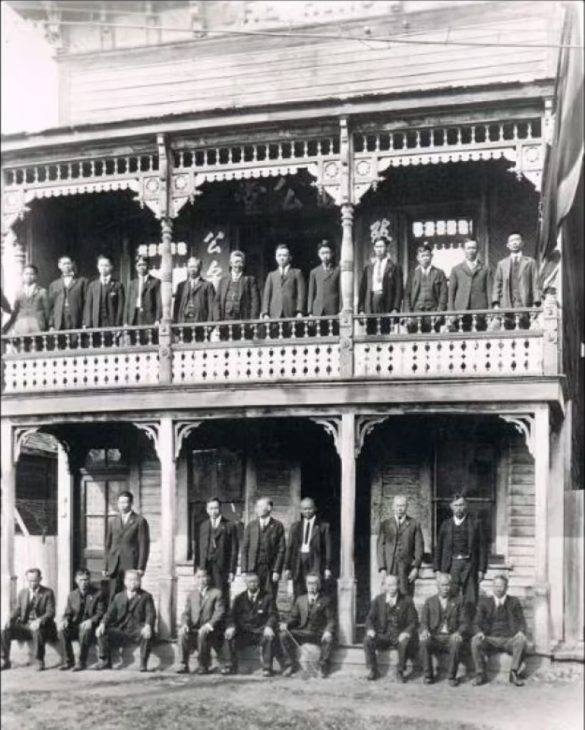Chinese Freemasons celebrate 160 years of community and cultural support in Canada
Organization with revolutionary roots set up 1st Canadian chapter in Barkerville, B.C., during gold rush
Article by: · CBC News ·

Cecil Fung, a leader of Canada’s Chinese Freemasons, is pictured in front of an altar inside the organization’s national headquarters in Vancouver’s Chinatown. (Ben Nelms/CBC)
Cecil Fung’s first visit to central B.C. was an enlightening one, and not just because he had lived most of his life in Vancouver since arriving from Hong Kong in the 1960s.
In 2003, Fung and fellow members of the Chinese Freemasons installed a 140th anniversary headstone at the historic cemetery for Chinese gold miners in Barkerville, where the organization set up its first Canadian branch in 1863.
“[I] saw a lot of historical value and a lot of personal satisfaction in touching our roots and the history of the Chinese in Canada,” he said of the visit.
Twenty years on, Fung, a leader of Canada’s Chinese Freemasons, is now set to celebrate another milestone for the organization.
Up to 600 members from 19 branches across the country are due to gather Sunday at its national headquarters in Vancouver, where they will perform rituals such as paying tribute to Chinese deities and greeting each other with hand gestures inherited from their founders.
Chinese Freemasons branches across Canada

Chinese Freemasons branches across Canada
Started as secret societies in southern China
Older than Confederation, Canada’s Chinese Freemasons organization — also known as Hongmen (洪門) in Chinese — has played a critical role in supporting Chinese communities by, for example, providing settlement services for immigrants historically, and promoting and preserving Chinese culture.
It’s also retained a controversial side in its stated goal of promoting Chinese unity, despite a history steeped in revolution.
The organization can trace its history even further back to the mid-17th century in southern China where, according to University of Notre Dame historian Dian Murray, it started as a group of secret societies that aimed to overthrow the Manchu-led Qing imperial dynasty and restore the Han-controlled Ming dynasty.
Two centuries later, many Hongmen members — predominantly male — migrated to California for the gold rush and established the first North American chapter of their organization in San Francisco in 1849. Most of them later moved to B.C.’s Cariboo region to stake new gold claims, according to the late Chinese Freemasons leader Harry Con.
It’s unknown how Hongmen adopted its English name and connection to the wider movement of freemasonry.
People join the organization by invitation, with sponsorship from existing members.
Contrary to much of western freemasonry, the Chinese Freemasons have always been open to female membership, according to their leaders.
Over the past century, many Chinese Freemasons branches across B.C. — including in Barkerville, which became a ghost town — have gone defunct due to aging membership, but many new ones have sprung up across the Americas, Australasia and Europe as mutual aid societies.
In Mainland China and Taiwan, Chinese Freemasons are a recognized political party named Zhigongdang (致公黨).
It’s a different story In Hong Kong, where police view Hongmen societies as organized crime groups. The societies are also known as triad societies (三合會); according to sociologist Harold Traver, who taught at the University of Hong Kong, this is a holdover from British colonial rule, where it was a criminal offence to become or claim to be a triad member and to perform triad rituals. The law persists to this day.
Funding Chinese revolution
Canada’s Chinese Freemasons also played a key role in Dr. Sun Yat-sen’s successful revolution against the imperial regime to build a Chinese democracy in 1912.
Well known in Vancouver thanks to the classical Chinese garden named after him, Sun — who became a Chinese Freemasons member in Honolulu in 1904 — made three trips to Canada to raise funds for the revolution, according to the organization’s records.
Vice-chair Ken Liu says the organization mortgaged several properties in Vancouver’s Chinatown — including its old lodge at 5 W. Pender St. where Sun once stayed — in order to finance the insurrection.

Dr. Sun Yat-sen during his stay in Vancouver in 1911 before the success of his revolution against China’s imperial regime. The picture was taken by Chinese Canadian photographer Yucho Chow. (University of Victoria Archives)
After the successful uprising, Sun became the first provisional president of the Republic of China, a regime which retreated to Taiwan during civil war in 1949 and has been based there since. He also remains a revered political figure in the Communist-led People’s Republic of China.
But he’s not quite as fondly remembered by the Chinese Freemasons, who claim that Sun didn’t return the money raised for him as promised.
“His nickname, 孫大炮 [Sun, the Big Liar] actually originated in Hongmen,” Liu said.
Cultural preservation
Despite the shortfall from the remortgaging, the organization raised enough funds to keep its properties, including the Chinese Times (大漢公報) newspaper building at 1 E. Pender St. The publication kept Chinese communities across the country informed from 1906 to 1992.
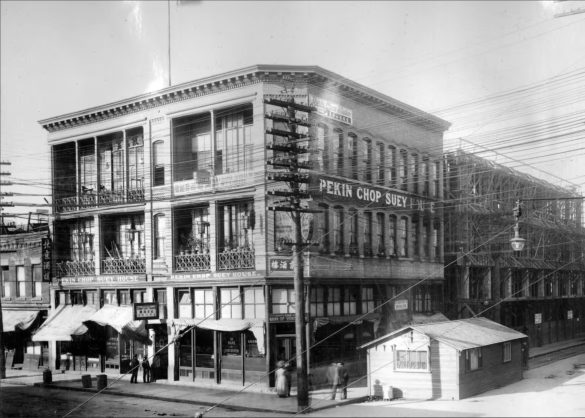
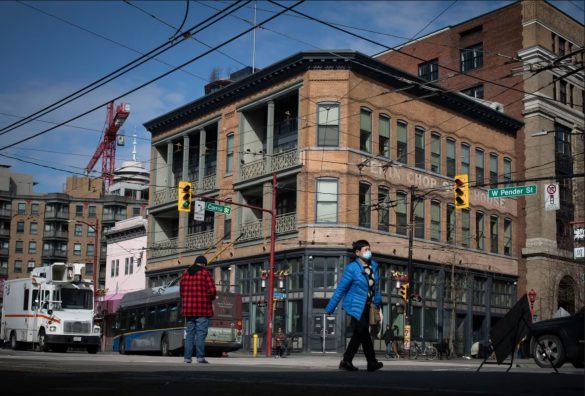
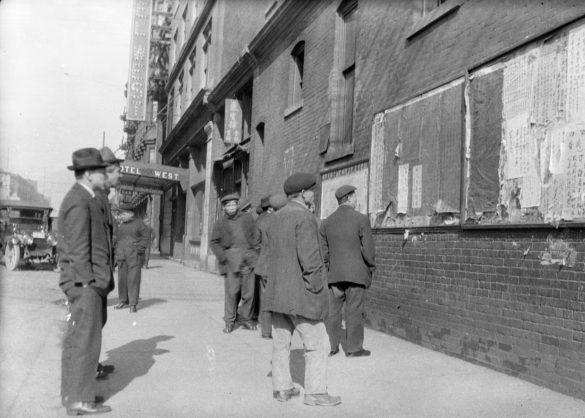
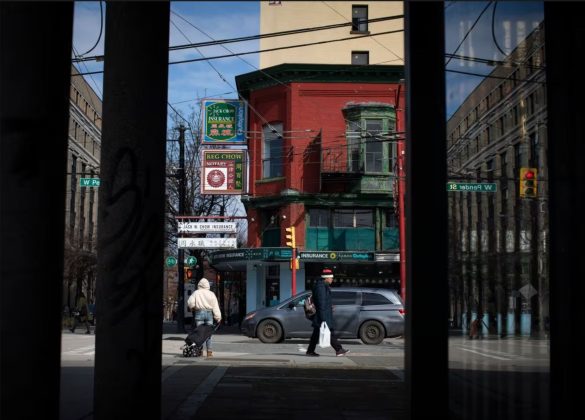
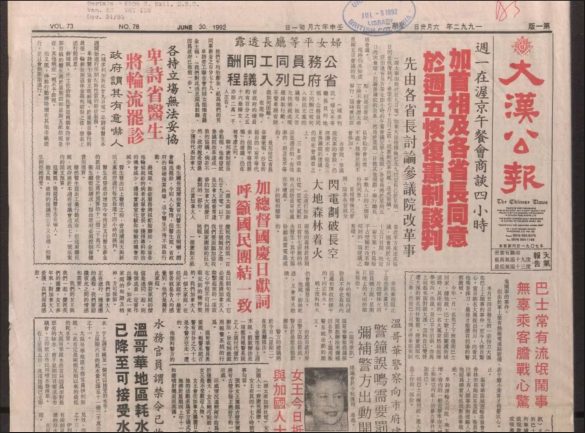
Like the newspaper, the organization’s promotion of Chinese language and culture has extended beyond Vancouver’s Chinatown.
In the southern Interior, the Kamloops Chinese Freemasons Association renovated a historic Chinese cemetery and provides Chinese language classes to young people.
President Elsie Cheung said she initially joined the association to boost female membership and, more importantly, to preserve Chinese culture in Kamloops, a city where only 1.3 per cent of the population are ethnically Chinese.
“If I don’t start doing it, that will be the end of the [Chinese] heritage — it will be fast fading off,” she said.

Elsie Cheung, president of the Kamloops Chinese Freemason Association, at the city’s Chinese cemetery. (Jennifer Chrumka/CBC)
Despite its history of good deeds, Canada’s Chinese Freemasons remain controversial for some.
The organization’s stated goal of promoting Chinese unity has resulted in it siding with Beijing on political issues such as the 2019 Hong Kong protests against a proposed law allowing extradition to Mainland China.
It also stands by its aim of promoting the peaceful reunification of China and Taiwan, as well as harmony among different Chinese communities in Canada.
Ken Tung, former chair of Vancouver-based immigrant support agency S.U.C.C.E.S.S., says as a non-member, he has tremendous respect for Chinese Freemasons and understands the organization supports whichever regime represents China.
But he also says the organization should remember its revolutionary history and the ideals behind it.
“They should see it is important to reflect … the Canadian values that we treasure today on freedom and democracy,” he said.

Cecil Fung is pictured signalling the word ‘harmony,’ a hand gesture inherited from Chinese Freemasons’ founders. (Ben Nelms/CBC)
Original CBC article here: CBC

